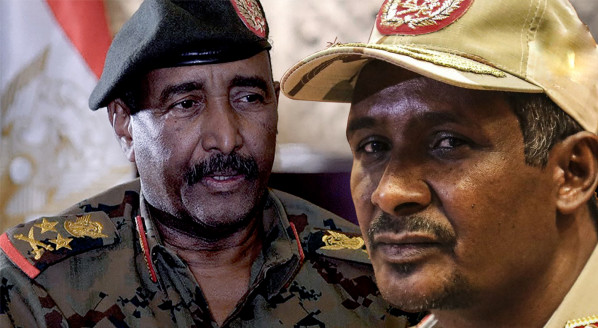Sudan war parties stymie Geneva talks

Lt Gen Abdelfattah El Burhan of the SAF (L),and Lt Gen Mohamed ‘Hemedti’ Dagalo of the RSF (R) (File photo)
Peace talks in Geneva, Switzerland, scheduled to take place today, face significant uncertainty as tensions between Sudan’s warring factions escalate. The US, alongside Saudi Arabia and Switzerland, had set August 14 as the date for negotiations aimed at ending the conflict. However, recent statements from both sides suggest the talks may be in jeopardy.
Commander-in-chief of the Sudanese Armed Forces (SAF) Lt Gen Abdelfattah El Burhan accused the Rapid Support Forces (RSF) of obstructing progress by failing to honour commitments from the Jeddah Declaration signed in May. “The RSF has shown intransigence and refrained from implementing the commitments,” El Burhan stated, underscoring a major barrier to restarting negotiations.
He emphasised the need for any peace agreement to ensure the dignity of the Sudanese people, insisting that military operations would not cease until the RSF withdraws from the civilian areas they have occupied, stating, “There can be no peace while the rebel militia occupies our homes.”
In a recent video statement, RSF Commander Mohamed ‘Hemedti’ Dagalo, reaffirmed his commitment to the Geneva talks, urging the SAF to join the negotiations. He announced the formation of a special force to protect civilians, signalling a potential shift in the RSF’s approach.
The Sudanese government, through its ambassador in Kigali, reiterated its reservations about the Geneva negotiations, particularly objecting to the involvement of the United Arab Emirates.
Acting Information Minister Jaraham Abdelgadir also expressed concerns about the lack of accountability for the RSF under the Jeddah Declaration and questioned the necessity of a new negotiation platform.
US Special Envoy for Sudan Tom Perriello stressed the importance of reaching a ceasefire and ensuring humanitarian aid delivery. He emphasised that the Geneva conference is intended to address the immediate humanitarian crisis rather than serve as a venue for political dialogue. Perriello highlighted the need for regional players like Egypt and the UAE to guarantee the implementation of any agreements.
The humanitarian situation in Sudan continues to deteriorate, with floods devastating 11 states and displacing nearly 10,000 families. Cameron Hudson, a senior fellow at the Center for Strategic and International Studies, warned that without a change in the SAF’s position, “a real humanitarian breakthrough is unlikely,” especially as the rainy season limits access to affected areas.








 and then
and then